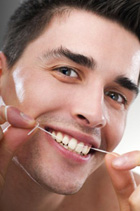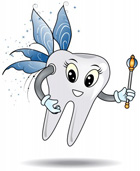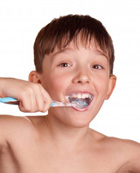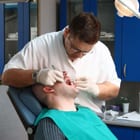 Taking good care of your teeth is very important. If you look after your teeth well, they will last you a lifetime but the consequences of ignoring dental hygiene can result in pain, expensive treatment and embarrassing dental conditions. From an early age we are all taught how to clean our teeth and the very good reasons for doing so, but often as people get older they become complacent or forget to look after their teeth as well as they can. Leeds dentists are urging all patients to care more for their teeth and can offer tips at check up appointments, as well as looking for any signs of decay.
Taking good care of your teeth is very important. If you look after your teeth well, they will last you a lifetime but the consequences of ignoring dental hygiene can result in pain, expensive treatment and embarrassing dental conditions. From an early age we are all taught how to clean our teeth and the very good reasons for doing so, but often as people get older they become complacent or forget to look after their teeth as well as they can. Leeds dentists are urging all patients to care more for their teeth and can offer tips at check up appointments, as well as looking for any signs of decay.
The best ways to look after your teeth are to clean them effectively and to see a dentist for a check up every six months. Good oral hygiene involves the routine brushing and flossing of teeth. This will remove bacteria and plaque, which will limit the threat of tooth decay and gum disease. Dentists say you should brush twice a day for at least three minutes. Use a soft-bristled brush for maximum effect. Flossing is also very important as it removes food and plaque form the more hard to reach areas, such as between the teeth.
However, even the most dedicated oral hygiene routine can still come under attack from the menace that is decay. This is why it is so important to see a dentist as often as every six months. This won’t give the decay any chance to take serious hold so treatment can be carried out before the problem has become too severe. Dentists will spot the early signs of decay and can help you to alter your routine to defend against it.





 Central Leeds dentists are always stressing the importance of flossing to all patients at dental check ups. This is because despite all the evidence that points to the benefits of flossing, there is still only a relatively small percentage of people who actually do it. Nearly everyone brushes their teeth, but many people are perhaps wrongly convinced that this enough.
Central Leeds dentists are always stressing the importance of flossing to all patients at dental check ups. This is because despite all the evidence that points to the benefits of flossing, there is still only a relatively small percentage of people who actually do it. Nearly everyone brushes their teeth, but many people are perhaps wrongly convinced that this enough. Maintaining good oral hygiene is about more than just brushing, yet so many of use rely entirely on brushing to keep our teeth clean and healthy. But we may be playing a dangerous game if we don’t pay enough attention to the other areas of the mouth.
Maintaining good oral hygiene is about more than just brushing, yet so many of use rely entirely on brushing to keep our teeth clean and healthy. But we may be playing a dangerous game if we don’t pay enough attention to the other areas of the mouth. Tooth decay and gum disease affect children more than any other chronic infectious disease. It is therefore very important for parents to ensure that their children’s teeth are as clean and healthy as possible. The alternative is a lifetime of pain and discomfort caused by having bad teeth.
Tooth decay and gum disease affect children more than any other chronic infectious disease. It is therefore very important for parents to ensure that their children’s teeth are as clean and healthy as possible. The alternative is a lifetime of pain and discomfort caused by having bad teeth. There are a number of very important reasons why you should floss every day. Flossing is often seen as not as important as brushing but this is not necessarily true. Brushing your teeth cleans the flat surfaces of the front and back of the teeth but it can’t reach certain parts of the teeth that are harder to get to. This includes the area between the teeth, which is too narrow for the bristles of a brush, and the areas around the base of the teeth and below the gum line.
There are a number of very important reasons why you should floss every day. Flossing is often seen as not as important as brushing but this is not necessarily true. Brushing your teeth cleans the flat surfaces of the front and back of the teeth but it can’t reach certain parts of the teeth that are harder to get to. This includes the area between the teeth, which is too narrow for the bristles of a brush, and the areas around the base of the teeth and below the gum line. With gum disease and tooth decay on the increase amongst children and adults in the UK, dentists are keen to stress the importance of effective teeth cleaning. For many people, cleaning their teeth simply involves giving them a quick brush in the morning when they get up and before they go to bed but a thorough dental hygiene routine should be so much more than that.
With gum disease and tooth decay on the increase amongst children and adults in the UK, dentists are keen to stress the importance of effective teeth cleaning. For many people, cleaning their teeth simply involves giving them a quick brush in the morning when they get up and before they go to bed but a thorough dental hygiene routine should be so much more than that. Bad breath, or halitosis, is a particularly unpleasant oral hygiene condition that affects not just the sufferer but also everyone else around them. Everyone has probably had bad breath at some time or other in their life and may not even have known about it as it is notoriously difficult to detect yourself. It is caused by the presence of bacteria in the mouth which decay and release a nasty smelling sulphurous odour that is then carried out on the breath.
Bad breath, or halitosis, is a particularly unpleasant oral hygiene condition that affects not just the sufferer but also everyone else around them. Everyone has probably had bad breath at some time or other in their life and may not even have known about it as it is notoriously difficult to detect yourself. It is caused by the presence of bacteria in the mouth which decay and release a nasty smelling sulphurous odour that is then carried out on the breath. In the fight against dental decay there are several key defences. The most important is regular and correct brushing and flossing of teeth. Brushing and flossing help to fight plaque, a filmy substance made up of bacteria and other debris, that covers the teeth and attacks the enamel. If plaque is not removed by brushing it will break down enamel causing tooth decay. This can lead to painful toothaches and abscesses that can lead to tooth loss. Flossing is particularly important for removing plaque and food debris from between teeth that causes tooth decay and is also responsible for 90 per cent of cases of bad breath. If allowed to remain plaque will also transform into tartar, a hard yellow/brown substance that also destroys enamel but that is impossible to remove by conventional cleaning.
In the fight against dental decay there are several key defences. The most important is regular and correct brushing and flossing of teeth. Brushing and flossing help to fight plaque, a filmy substance made up of bacteria and other debris, that covers the teeth and attacks the enamel. If plaque is not removed by brushing it will break down enamel causing tooth decay. This can lead to painful toothaches and abscesses that can lead to tooth loss. Flossing is particularly important for removing plaque and food debris from between teeth that causes tooth decay and is also responsible for 90 per cent of cases of bad breath. If allowed to remain plaque will also transform into tartar, a hard yellow/brown substance that also destroys enamel but that is impossible to remove by conventional cleaning.

